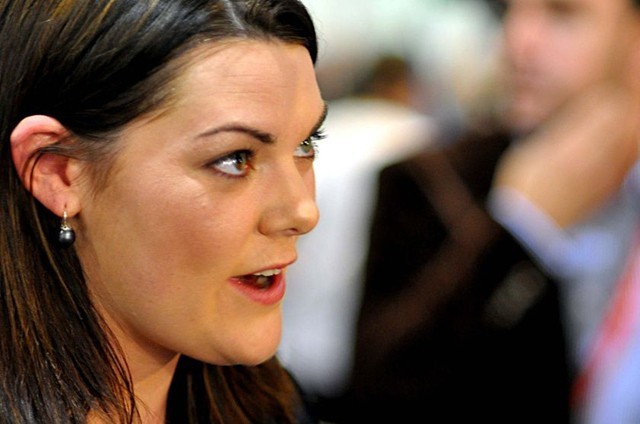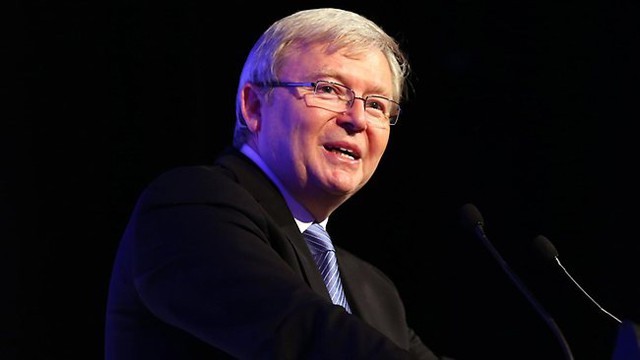PETER LLOYD: Advocates of gay marriage have said no thanks to the Prime Minister’s offer to hold a referendum if Tony Abbott refuses to allow Coalition members a conscience vote on the issue. They say any public vote could be used by reform opponents to whip up a fear campaign.
Ashley Hall reports from Canberra.
ASHLEY HALL: The new Prime Minister was once an opponent of marriage equality, but after what he calls a difficult personal journey, Kevin Rudd announced in May that he’d switched his position.
It brings his personal views into line with the Labor Party’s policy. Already this year, Labor MPs have been allowed to vote with their conscience on questions of gay marriage.
But the Opposition Leader Tony Abbott has refused to allow members of the Coalition to do the same.
Today, Mr Rudd called on Mr Abbott to change his position.
KEVIN RUDD: Whoever wins the next election, please, let’s just have the civility to open this to a conscience vote for all.
I’ve indicated publicly where I will go on this, and if he doesn’t, then I think we then have to look at other mechanisms, including the possibility of recourses to plebiscite or referendum.
ASHLEY HALL: Marriage equality advocates are thrilled the new Prime Minister has spoken about the issue in his first major media event.
But they don’t support Mr Rudd’s call for a public vote.
RODNEY CROOME: We have consistently opposed a national plebiscite or referendum on marriage equality for a number of reasons.
ASHLEY HALL: Rodney Croome is the national convenor of the group Australian Marriage Equality.
RODNEY CROOME: We think it would be unnecessarily expensive, it could potentially be deeply polarising, becoming a platform for fear-mongering against the gay and lesbian community, and we think that our politicians are elected and make these kinds of decisions, rather than hand-balling them back to the voters.
ASHLEY HALL: But you say that the overwhelming majority of Australians do support marriage equality. Would that not come through in a poll like this?
RODNEY CROOME: My concern is not about the outcome.
I believe a majority of Australians would vote for marriage equality.
My concern is about the process. I think a referendum would be quite divisive, particularly when, at the moment, there’s support from only one party not from the other.
And also potentially the fear-mongering we’d see against the gay and lesbian community could be quite destructive.
Particular for young, same-sex attracted people coming to terms with their sexuality, they don’t need to see the kind of fear and hate campaigns that I feel would inevitably come out during a referendum.
ASHLEY HALL: Mr Croome says overseas examples, including New Zealand and Britain, have shown that the best way forward is the establishment of a cross-party working group on the issue.

But the Australian Greens spokeswoman Sarah Hanson-Young argues the time for talking is over.
SARAH HANSON-YOUNG: We could make this happen right here on the Parliament floor. We don’t have to send it to a referendum.
ASHLEY HALL: But how would you do that if the Coalition won’t agree to a conscience vote, where do you get the numbers?
SARAH HANSON-YOUNG: Well I think the Labor Party should vote according to the Labor Party policy.
ASHLEY HALL: So if the Liberals are going to vote as a bloc, so should Labor?
SARAH HANSON-YOUNG: I think it is the Labor Party policy and we have the leader of the Labor Party now saying he’s a supporter of marriage equality and the sad thing about the last three years is actually if Labor members had voted for marriage equality together with the Greens we would already have it here in Australia.
So this idea of pushing it off to a referendum is really squibbing the leadership on marriage equality.
ASHLEY HALL: The Opposition Leader Tony Abbott has said he’ll allow the party room to reconsider the question of same-sex marriage when it reconvenes after the next election.
PETER LLOYD: Ashley Hall reporting.
Author: Ashley Hall
Publication: ABC PM
Date: 28 June 2013

